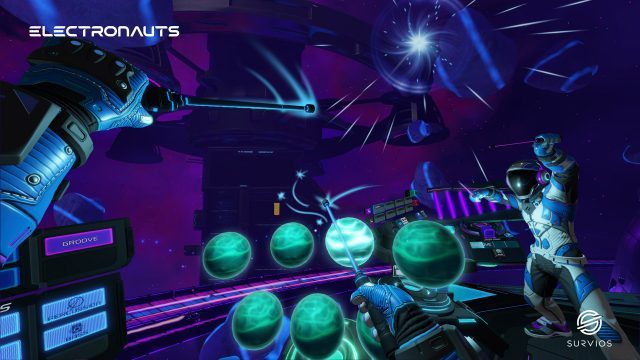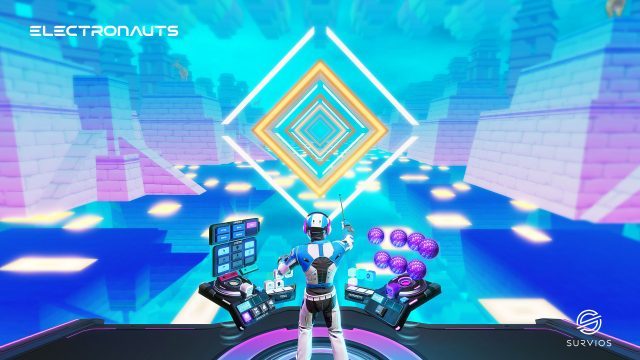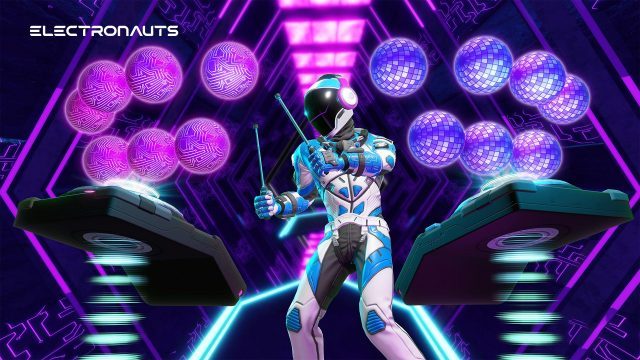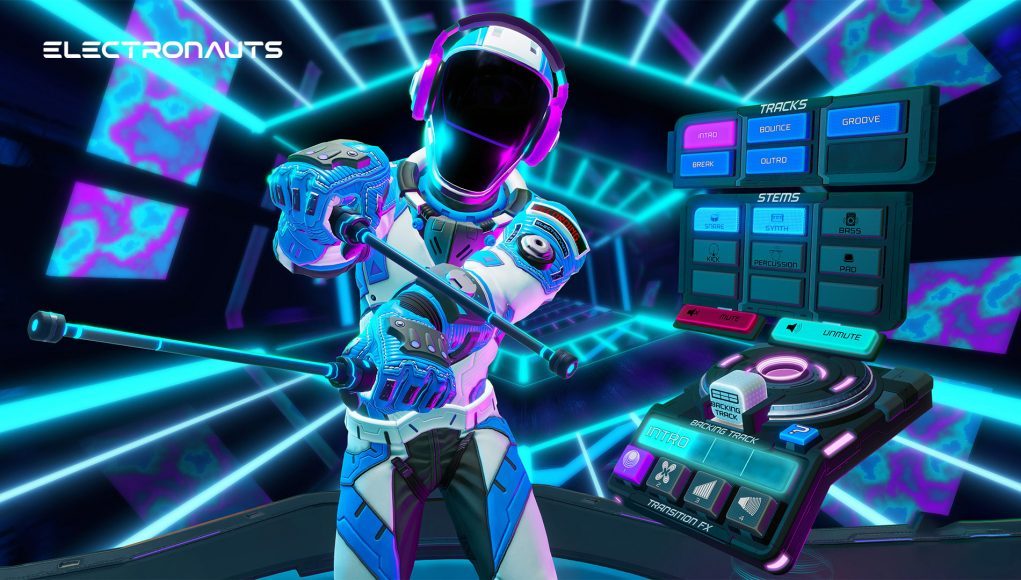Electronauts sits at an interesting intersection somewhere between game, experience, and tool. Your experience with Electronauts then may vary depending upon what you hope to achieve with it. If you’re anything like me—someone who can fall deep into music, but isn’t musically trained—you’ll find a totally unique and approachable platform for expressing your inner groove.
Electronauts Review Details:
Developer: Survios
Available On: Oculus Store (Rift), SteamVR (Vive, Rift), PlayStation VR
Reviewed On: HTC Vive
Release Date: August 7th, 2018
Experience
Electronauts can be thought of as a virtual reality DJ tool, but it’s smartly design to be accessible by people who don’t know the first thing about DJing. Each song in the game (40+ at launch, covering a range of EDM sub-genres) is effectively a custom-built music kit which comes complete with backing tracks, freestyle instruments, ‘sound grenades’ (for one-off percussion), and vocal segments (for some songs).
The basic experience involves queueing different backing tracks—which are logically named, for example: Intro, Build, Drop, Break, Deep, Outro—layering in vocals and loops, and jamming on the freestyle instruments. It sounds simple, but there’s an impressive amount of depth to the tools you’re given. But more on that later. For now, here’s a short overview of the tools, which will be helpful context for the rest of this review:
Now, if Electronauts just threw all of this at me, I’d surely make a fool of myself, as I went into this knowing almost nothing about DJing. Thankfully, the game does a lot behind the scenes to make whatever you do sound decent. This is thanks largely to what Survios calls the ‘Music Reality Engine’: an underlying system that keeps all aspects of music in the game on rhythm and in tune. In addition to keeping all of the backing tracks and stems on beat, freestyle instruments shift your notes to keep them in sync (also called quantization).
With the Music Reality Engine, and a concise tutorial built into the game, it didn’t take long before I began to understand what I could do with the tools in front of me and started stringing together satisfying sequences that had me grooving to the beat. After getting a feel for the basics and being able to competently direct the flow of a song, I started to appreciate the additional depth waiting beneath the surface.
While the freestyle instruments (which usually come in the form of orbs) are fun to jam out with, you can also hold a button to record each time you hit the instrument, effectively capturing a small sample which will play repeatedly. When it comes to vocals, you can jump around between verses and even individual lines, offering a lot of flexibility to how the vocals will play out in your song. In the backing tracks you can mute individual instruments to create a different flavor, or mute the entire track at once to highlight a specific part of the vocals or an instrument solo. Each tool (instruments, vocals, etc), can be muted or unmuted at any time with a shortcut button, while the sound grenades (which you throw to trigger a noise) act as percussive exclamations.
Once you grasp the capabilities of all the tools, you’ll have yet greater control over the sound and feel of each song, and it becomes incredibly satisfying to flawlessly plan and execute a perfect transition to a new part of the song, or to play a fitting freestyle solo. Even finding a way to bring a song to a natural conclusion can be a fun challenge that fosters a feeling of musical resolution.
For musicians out there, Electronauts offers still deeper features, like the ability to turn off quantization for instruments, build song arrangements in advance (instead of queuing backing tracks on the fly), change the stems that accompany each backing track in a custom arrangement, and create interface layouts for quickly toggling between groups of tools (rather than switching one tool at a time).
Electronauts feels highly accessible, but also like it could be used for real performances. This is reinforced not only by the deeper tools mentioned above, but by a strong set of in-game virtual camera controls that allow you to adjust what other people see.
The typical first person view, as displayed on your desktop, is smoothed by default, so onlookers see something more digestible than the quick movements of your head. Additionally, the game offers a virtual selfie stick, an in-game camera and monitor which you can freely place anywhere, with the resulting view showing up on your desktop. There’s also an orbiting camera, which circles your Daft Punk-esque avatar as you rock out. To top it all off, there’s some visualizer controls, allowing you to adjust the color and speed of the background visualization.
Of course, you can pipe the output from your desktop monitor to a streaming service or even a projector if you wanted to play in front of a live audience. All of the camera and visualizer controls can be adjusted on the fly as you are DJing, making it possible to put on a compelling show all by yourself.

If you aren’t the type who wants to perform in front of a crowd, but you do happen to know a jam buddy with a VR headset, Electronauts supports multiplayer (on Rift and Vive only) for two players. This puts both of your avatars in the same space with access to the same tools, letting you DJ any track cooperatively. Electronauts offers cross-play between the Oculus platform and SteamVR.
Immersion

Electronauts offers a surprisingly accessible utility for achieving the feeling of DJing in virtual reality, but it goes beyond being just a tool by wrapping everything up in a thematic package that feels equal parts Tron and Daft Punk.
The opening of Electronauts reveals you to be on a futuristic ship (powered by sick beats, no doubt) blasting through space. When you launch into a new song, your ship lifts off and ‘travels’ to the song. Transitioning between songs is seamless both audibly and visually, as your ship jumps to hyperspace before arriving at your new song destination.
This ‘spaceship’ metaphor is but a setting—there’s no lore or objectives in Electronauts—but it does tie the experience together into a cohesive whole that never reminds you that you’re inside of a VR headset.
That extends to the tools interface too, which has a surprisingly functional design which keeps things from being overcrowded while at the same time keeping everything within easy reach. There are interface lessons to be learned from Electronauts that extend far beyond musical VR games, but that’s something to explore another day.
Of course it’s worth noting that your enjoyment of Electronauts, and how much you tap into the beat, will depend deeply on your preference in music. The game is wholly built around EDM, covering a broad range of sub-genres.
Comfort

Electronauts has you standing in one place, so there’s no need for any artificial locomotion, largely ensures things will remain perfectly comfortable. While you’ll occasionally see some full screen movement (like the visualizer background that’s constantly coming toward you), I never once felt dizzy or uneasy in the game, even after continuous sessions of an hour or more.
The tools in Electronauts work well and are easy to understand. They’re all triggered in simple and intuitive ways without any unnecessary or uncomfortable gestures or hand positions. Importantly, the interface mostly keeps you looking forward rather than down, which greatly helps prevent headset-induced neck fatigue (due to the front-heavy nature of VR headsets).







